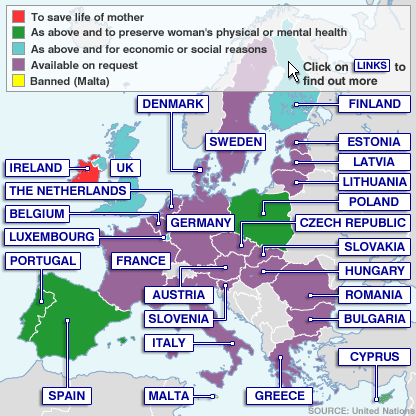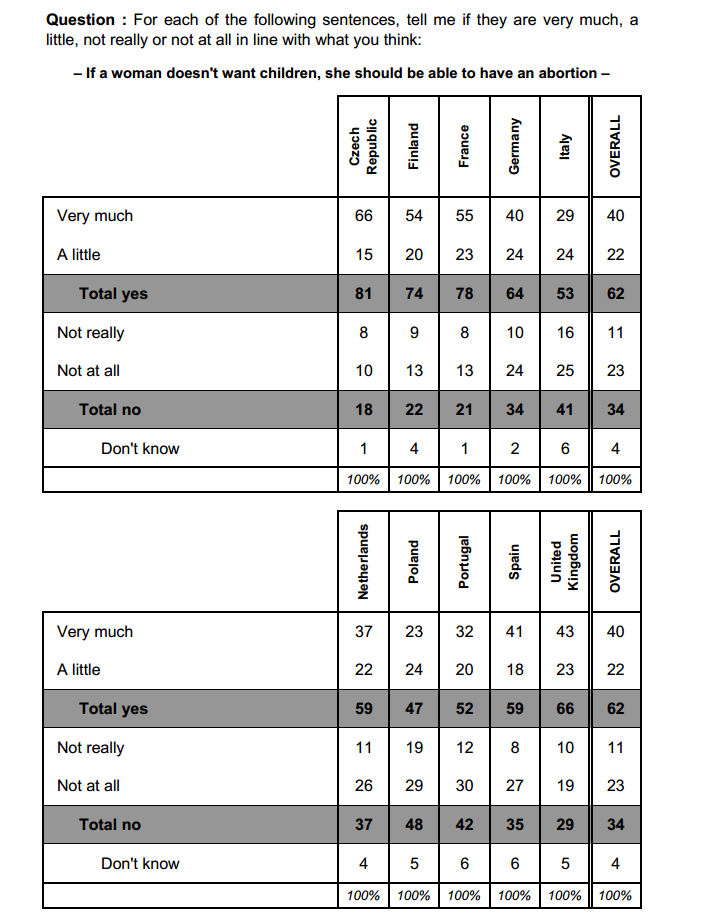In very general terms, abortion is _not_ a "top of the mind" issue for voters in Europe. It's certainly a contentious social issue, as is everywhere, and different countries follow different approaches, but other than very specific examples it's not a frontline issue in European politics.
I might be stating the obvious here, but abortion laws are not uniform in Europe or the European Union. That said, with the exception of Ireland and Malta, you can assume a "available on request" approach with a minimum gestational limit of 12 weeks in the EU and most non EU countries, that is (broadly) similar to the US approach. BBC News has a very interesting [map of Europe's abortion laws](http://news.bbc.co.uk/2/hi/6235557.stm) that gives a quick overview of related national regulations:

While the above map might show a somewhat uniform approach, at least in the core countries of the EU, it doesn't really say much about the population's social acceptance of abortion, other than the fact that at some point in the past it was high enough for regulators to legalize the practice.
[Havas Worldwide](http://www.havasworldwide.com/) (then Euro RSCG) commissioned [a study on "European values"](http://www.thebrusselsconnection.be/tbc/upload/attachments/European%20Values%20Overall%20EN.pdf) in 2005 that included the question:
> If a woman doesn't want children, she should be able to have an abortion
The results of the study showed varying support for abortion, with the exception of Poland<sup>1</sup>, the only country where the (slim) majority answered "total no":

This is just one study, but it includes the more populous countries and shows that public opinion is more or less on par with established policies and regulations.
Ireland is the notable exception when it comes to abortion and politics, the [Eight Amendment of the Constitution of Ireland](http://en.wikipedia.org/wiki/Eighth_Amendment_of_the_Constitution_of_Ireland) (7 October 1983) introduced a constitutional prohibition of abortion:
> The State acknowledges the right to life of the unborn and, with due regard to the equal right to life of the mother, guarantees in its laws to respect, and, as far as practicable, by its laws to defend and vindicate that right.
The ban was loosened up a bit by the [Thirteenth](http://en.wikipedia.org/wiki/Thirteenth_Amendment_of_the_Constitution_of_Ireland) and the [Fourteenth](http://en.wikipedia.org/wiki/Fourteenth_Amendment_of_the_Constitution_of_Ireland) Amendments, however the issue remains controversial in Ireland.
In December 2010, the [European Court of Human Rights](http://en.wikipedia.org/wiki/European_Court_of_Human_Rights) (ECtHR) found that Ireland had failed to comply with the [European Convention on Human Rights Act](http://en.wikipedia.org/wiki/European_Convention_on_Human_Rights) in the [Case of A, B, and C v. Ireland](http://hudoc.echr.coe.int/sites/eng/pages/search.aspx?i=001-102332#{"itemid":["001-102332"]}), while at the same time recognizing that Ireland was free to have whatever abortion laws it wants, provided they are clear, effective and accessible. Prior to the ruling, A, B, and C v. Ireland was quoted as a potential European equivalent to [Roe v. Wade](http://en.wikipedia.org/wiki/Roe_v_Wade), but the ECtHR emphasized that the European Convention on Human Rights Act does not provide a straightforward right to abortion.
Unfortunately, the lack of clarity on Ireland's abortion regulations identified by the ECtHR was put to the test in October 2012, [with tragic results](http://www.guardian.co.uk/world/2012/nov/14/ireland-woman-dies-after-abortion-refusal):
> Savita Halappanavar, who was 17 weeks pregnant, died of septicaemia a week after presenting with back pain on 21 October at University hospital in Galway, where she was found to be miscarrying.
>
> After the 31-year-old dentist was told that she was miscarrying, her husband reportedly said that she had asked for a medical termination a number of times over a three day period, during which she was in severe pain.
>
> But he said these requests were denied because a foetal heartbeat was still present and they were told at one point: "This is a Catholic country."
Ms. Halappanavar's death re-started the abortion debate in Ireland, and to a lesser extend in Europe, and currently the majority opinion seems to be in favour of drastic reforms in the country's abortion policies that would bring Ireland closer to the rest of Europe when it comes to women's access to abortion.
In conclusion and returning to your core question, I can't imagine the issue becoming as divisive as in the US even if public opinion was largely against abortions, at least not in the near future. I tried to get a better feeling of the state of the debate in the US, and I was both horrified and surprised when I stumbled upon the [anti-abortion violence](http://en.wikipedia.org/wiki/Anti-abortion_violence) article on Wikipedia. If this is the level of tension you had in mind, then no, Europe is nowhere near that level of craziness when it comes to issues with religious overtones.
<sub><sup>1</sup> I'll venture a guess and say that Poles at the time were more open to the Catholic Church's view on the issue, given that the then Pope, John Paul II, was Polish.</sub><br />